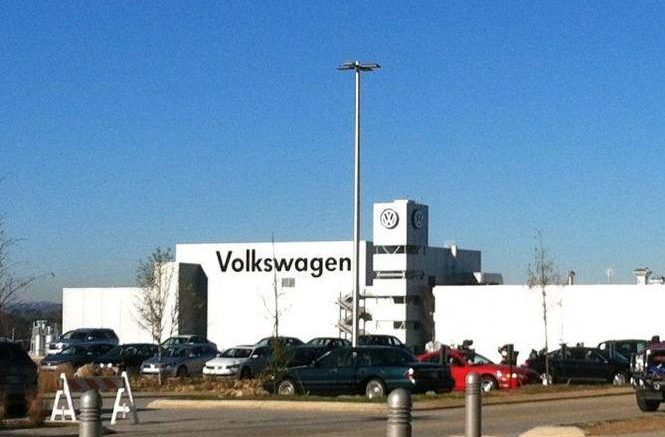Tennessee residents who own Volkswagen vehicles affected by the company’s emissions scandal have a few options for compensation.
“Consumers have choices in this settlement—this is our theme,” said Elizabeth Cabraser, court-appointed lead counsel and chair of the committee that negotiated the settlement on behalf of class members. “It’s the choices of the drivers that will shape and give substance to this settlement.”
All VW owners whose cars meet the requirements are included in the settlement. Click here for consumer information.
Business as usual at Chattanooga plant
“At the factory, we are building the first test models of the new midsize SUV, while building the newly freshened Passat,” spokesman Scott Wilson said via email. “We have experienced no changes in either shift schedules or employment.”
In Tennessee, 11,448 vehicles are affected.
What are the options?
Once the consumer program is approved by the court, affected Volkswagen owners will receive restitution payment of between $5,100 and $10,000.
Then they have two main options:
—Consumers can have the company buy back the vehicle at prescandal value, which means (as long as the car runs) regardless of its condition, they will get the original value of the car. The car’s depreciation stops at the point that the scandal broke, which was September 2015.
—Vehicle owners can let the company fix their cars, assuming the court approves a fix, so that they meet all the appropriate emissions guidelines. Owners who choose the modification option would also receive an extended emissions warranty and a “lemon” law-type remedy to protect against the possibility that the modification causes subsequent problems. Before the fix, class members will be notified about any impact on mileage or durability of the car.
The settlement will cost about $15 billion to settle claims that Volkswagen’s cars cheated emissions regulations.
Some locally made Passats are affected, and in addition to those, the settlement includes 2009–2015 models of the Jetta, Beetle, Golf and Audi A3.
It’s the result of EPA allegations that the company broke the law by installing “defeat device” software, which detects when a car is undergoing an emissions test and only turns on full emission controls to pass the test. When the car isn’t being tested, it is polluting more than officials reported to the EPA.
This class-action settlement—which doesn’t include about 100,000 Audis and Porsches—affects 475,000 owners and lessees of 2.0-liter diesel vehicles.
Lessees and sellers are also eligible for restitution and a no-penalty lease termination option.
Other payments
—Environmental Mitigation Fund: Volkswagen will pay $2.7 billion into a trust to support environmental programs throughout the country to reduce emissions of nitrogen dioxide and nitric oxide.
This fund, also subject to court approval, is intended to mitigate the total lifetime excess emissions from the 2.0-liter diesel vehicles.
Under the terms of the mitigation trust, Tennessee is eligible to receive an initial allocation of more than $42 million to fund mitigation projects.
—Additional payment to the states: In addition to consumer restitution, Volkswagen will pay more than $1,000 per car for repeated violations of state consumer protection laws, amounting to $570 million nationwide.
This amount includes $12.5 million paid for affected vehicles Volkswagen sold and leased in Tennessee.
— Zero-emissions vehicles: Volkswagen has committed to investing $2 billion over the next 10 years for the development of nonpolluting cars, or zero-emissions vehicles, and supporting infrastructure.
—Preservation of environmental claims: The settlement by state attorneys general preserves all claims under state environmental laws, and Tennessee maintains the right to seek additional penalties from Volkswagen for its violations of environmental and emissions laws and regulations, according to a news release.
Analysts, officials weigh in
Analysts called the settlement “unprecedented” because of the dollar amount and the situation that prompted it.
Cabraser said it was unprecedented because of the “remarkably fast timeline.”
Jessica Caldwell, Edmunds.com’s director of industry analysis, said the $15 billion is a pill that needs to be swallowed so the company can move on.
“This massive financial hit won’t magically make VW’s troubles disappear overnight, and it still has a long road ahead to repair its reputation among car shoppers,” she also said in a prepared statement. “The good news is that history is on Volkswagen’s side. Other automakers have successfully weathered their own high-profile scandals, and VW has the resources and infrastructure in place to do the same.”
Karl Brauer, senior analyst at Kelley Blue Book, called the settlement “the most comprehensive and customer-friendly resolution” he’s ever seen.
“Not only will VW diesel owners have multiple compensation options, but the company will also fund environmental efforts and advanced clean-air technology to offset its excessive diesel emissions,” he said in a prepared statement. “It’s a huge step toward resolving the issue, though many legal hurdles remain, as does finding a resolution for VW’s customers in markets outside the U.S.”
Source: nooga.com




